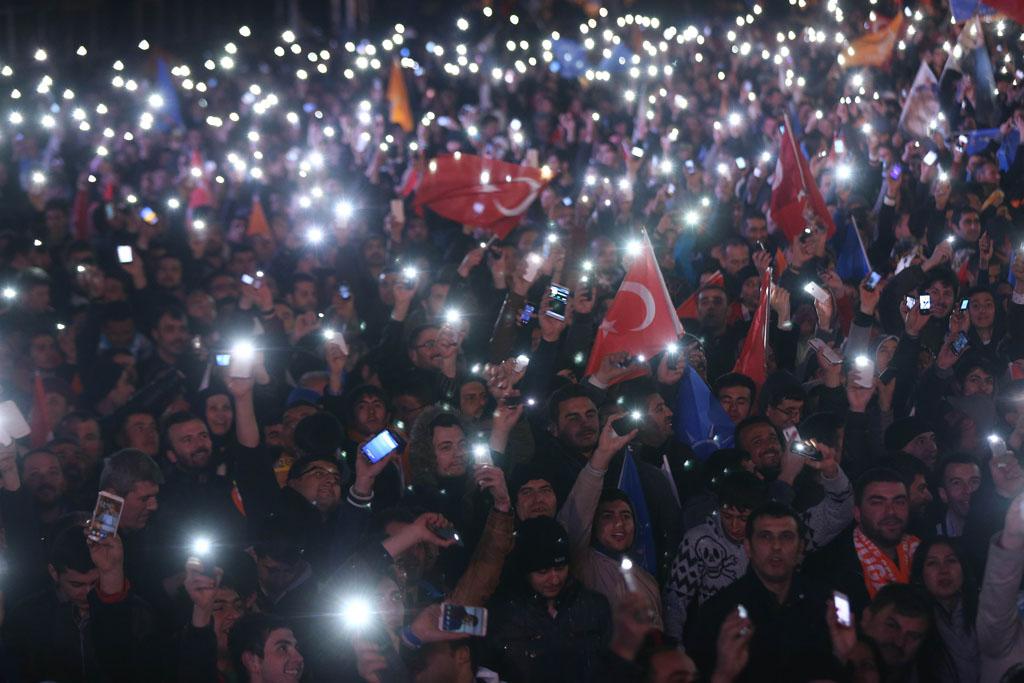Another victory for Erdogan
Supporters of Turkey’s ruling AKP party cheer as they follow the election’s results in front of the party’s headquarters in Ankara, March 30, 2014.
ISTANBUL, Turkey — By the early hours of Monday morning, it appeared clear that the party of Turkey's prime minister, Recep Tayyip Erdogan, won an extraordinary victory in countrywide municipal elections.
Among the thousands of polls held across Turkey on Sunday, the results from Istanbul, Ankara and the national average constitute a verdict. By 2 a.m. on March 31, local time, 80 percent of the votes were in and the governing Justice and Development Party (AKP) looked to be headed back to Istanbul City Hall. Ankara was still too close to call.
Opposition television channels aired discussions of vote rigging Sunday, but there were no confirmed reports of irregularities.
Sunday's vote was the first poll since the Gezi Park protests began in May and the first since an investigation of alleged corruption among close associates of Erdogan became public in December.
"It's a critical win, especially after the Dec. 17 operation," a man named Aydin said, referring to the corruption investigation, in the ballroom of the AKP's Istanbul headquarters on Sunday.
"We have presidential elections in August. You see that man?" Aydin said pointing to a live feed of Erdogan giving a speech in Ankara. "He's the next president."
The government responded to the corruption investigation by transferring and firing several senior police officers and prosecutors, and increasing government control over the judiciary.
Soon after, recorded phone calls between the prime minister and his family and friends that purported to be evidence of massive graft began appearing on YouTube, posted regularly and anonymously.
Most critics presume these recordings prompted the government's recent decision to block Twitter and YouTube.
The government denies the allegations and says it's a conspiracy led by Fethullah Gulen, the Turkish preacher that lives in Pennsylvania and commands a following that is said to include many in the police forces and courts.
Sunday's vote registered the electorate's views of the Gezi protests, the corruption allegations, and the government's conflict with the Gulen community. It also suggested a trend of future support for the government and, crucially, Erdogan.
He will now decide whether to run for president of Turkey, and how to lead his party through general elections scheduled for before summer 2015.
Though these were local elections for mayors and councillors, the most important politician in the contest was the prime minister. Inside Erdogan's party headquarters in Istanbul, the image of re-elected mayor Kadir Topbas was afforded only a relatively small space on the election results screen. Images of Erdogan, on the other hand, dominated the room. Outside, crowds chanted his name. Many wore Erdogan headbands.
By contrast, in a high school parking lot in Atasehir, another Istanbul municipality, a young couple rested on a bench next to BMWs and Mercedes.
"When I listened to Mustafa Sarigul [the main opposition candidate for mayor of Istanbul], I thought his ideas were utopic," said Asuman, one of the people in the couple. "But I voted for CHP [the main opposition party] … It doesn't matter as long as AKP loses."
Despite AKP's victory, the future remains uncertain. A significant portion of the country has been outraged by the leaks, phone taps, and alleged crime. It is unlikely they will let these matters drop.
At 4 a.m., two dozen supporters at CHP's Istanbul headquarters remained buoyed by the prospect of winning Ankara.
If the CHP do win Turkey's capital, it will be an important win though unlikely to dampen the spirits of the thousands of AKP supporters celebrating yet another victory.
Every day, reporters and producers at The World are hard at work bringing you human-centered news from across the globe. But we can’t do it without you. We need your support to ensure we can continue this work for another year.
Make a gift today, and you’ll help us unlock a matching gift of $67,000!
